Concordia’s AI & Quantum Innovation Lab pairs faculty expertise with student talent to help industry and community partners prototype real solutions; ethically and securely. Rooted in CUW’s mission, we treat AI and quantum as tools for service: deepening understanding, preparing vocation-ready graduates, and advancing projects that bless the Church and the world. Through discovery sprints, a prototyping studio, and research-fellow certificates, we turn ideas into tested prototypes while forming students in mind, body, and spirit.

Guided by faith, we view AI and Quantum technologies not merely as tools for advancement, but as opportunities to reflect Christ’s light in the responsible stewardship of human creativity, ensuring innovation remains tethered to ethical responsibility, compassion, and service.
Our mission
The AI & Quantum Innovation Lab fosters an environment where cutting-edge technology meets faithful purpose. We strive to:
- Deepen understanding of Artificial Intelligence and Quantum Computing while confronting the ethical dilemmas these technologies pose.
- Build bridges between students, faculty, and industry partners to create meaningful collaborations that advance both knowledge and application.
- Provide hands-on opportunities through internships, projects, and research that prepare students to serve and lead in a rapidly evolving technological landscape.
- Incubate and accelerate student and faculty-led initiatives, including grant-funded projects, that align innovation with service to community and society.
View our Biblical Guidelines from CUW’s Theology Department.
AI Consultation Request
Areas of focus
Data is classified and handled in partner-isolated sandboxes with least-privilege access, audited logging, and reproducible pipelines. We prefer synthetic/de-identified datasets and explicit Data Use Agreements; when regulated data is needed, we operate under FERPA/HIPAA-aligned controls and IRB review as appropriate. Every project carries a DPIA-lite and an IP/publication plan from day one.
Our default is “privacy by design”: minimize data, maximize utility via techniques such as differential privacy, secure aggregation/federated learning, and model-level redaction when appropriate. We publish model cards and data sheets, run privacy threat modeling at kickoff, and measure leakage/attack surfaces during evaluation. The goal is actionable models for partners without moving or exposing sensitive data.
We take a hybrid-first approach: students and faculty use simulators and vendor backends to test algorithms like VQE/QAOA and quantum-enhanced ML on real use cases (optimization, materials, logistics). Projects emphasize noise modeling and error-mitigation so results are honest and decision-relevant today—not hype. The lab helps partners build a roadmap from strong classical baselines to future quantum advantage.
Christian faith shapes both what we build and how we build it: each project includes an Ethics Note that considers human dignity (imago Dei), fairness, and downstream impact on workers and communities. Through a Faith & Technology colloquium, service-oriented projects, and faculty mentoring, students learn to see innovation as vocation—using their gifts to serve the neighbor. Decision gates favor solutions that reflect compassion, stewardship, and truth over mere novelty.
Click here to view Concordia's AI & Quantum Innovation Lab Biblical Guidelines.
Current research
AI Clinical-Trial Navigator. In partnership with a regional oncology group, our student–faculty team is co-developing an AI tool that uses large language models and knowledge graphs to transform de-identified patient data into rapid, evidence-based trial matches. Deliverables include a secure clinician dashboard, pilot-ready prototype, and paid student internships—showcasing how CUW talent accelerates real-world impact in healthcare.
CUW students and faculty are working in collaboration with several external partners (Santa Fe Institute / Portland State, Oak Ridge National Laboratory (ORNL), Quantinuum, IonQ, and the U.S. Army Research Laboratory) on a swarm-intelligence control layer that teaches AI “guardians” to detect and preempt qubit decoherence in quantum systems, trained in high-fidelity Lindblad simulations built from real device T₁/T₂ data and validated across multiple hardware platforms.
In partnership with Concordia’s School of Health Professions, faculty and students are developing a cutting-edge educational simulation that allows occupational and physical therapy students to explore how different environmental modifications can accommodate individuals with disabilities. This faculty and student-led project, housed in the AI & Quantum Innovation Lab, blends real-world learning with emerging technologies like generative AI, offering both a standard PC application and an immersive VR experience to prepare future practitioners for compassionate, effective care.
The goal of this project is to develop privacy-preserving machine learning models, using technologies such as PySyft, to help generalize efforts at universities to improve student success and retention. Many universities collect extensive data on their students, including academic performance, demographics, financial aid information, campus involvement, and more. Applying advanced machine learning techniques to this rich data has the potential to uncover valuable insights that could help identify at-risk students early in their academic journey and enable targeted interventions to improve their likelihood of success and ultimately boost retention rates.
National Artificial Intelligence Research Resource (NAIRR) Grant 240195
Text classification in natural language processing (NLP) is evolving rapidly, particularly with the surge in transformer-based models, including large language models (LLM). This paper presents an in-depth survey of text classification techniques across diverse benchmarks, addressing applications from sentiment analysis to chatbot-driven question-answering. Methodologically, it utilizes NLP-facilitated approaches such as co-citation and bibliographic coupling alongside traditional research techniques. Because new use cases continue to emerge in this dynamic field, the study proposes an expanded taxonomy of text classification applications, extending the focus beyond unimodal (text-only) inputs to explore the emerging field of multimodal classification. While offering a comprehensive review of text classification with LLMs, this review highlights novel questions that arise when approaching the task with transformers: It evaluates the use of multimodal data, including text, numeric, and columnar data, and discusses the evolution of text input lengths (tokens) for long text classification; it covers the historical development of transformer-based models, emphasizing recent advancements in LLMs; it evaluates model accuracy on 358 datasets across 20 applications, with results challenging the assumption that LLMs are universally superior, revealing unexpected findings related to accuracy, cost, and safety; and it explores issues related to cost and access as models become increasingly expensive. Finally, the survey discusses new social and ethical implications raised when using LLMs for text classification, including bias and copyright. Throughout, the review emphasizes the importance of a nuanced understanding of model performance and a holistic approach to deploying transformer-based models in real-world applications.
Academic programs
If you’re interested in pursuing a career involving artificial intelligence, check out Concordia’s related academic offerings:
- Bachelor of Science in Applied Artificial Intelligence
- Bachelor of Science in Applied Computer Science
- Bachelor of Science in Business Analytics and Organizational Performance
- Bachelor of Science in Computer Science
- Master of Science in Business Analytics
- Master of Science in Computer Science
Lab leadership
Advisory board:
- Dr. Steve Taylor, Vice President of Innovation and Chief of Staff
- Dr. Rachel Ware Carlton, Dean - School of Arts and Sciences
- Dr. Scott Niederjohn, Dean - School of Business
- Dean Rennicke, Assistant Dean for External Relations - School of Business
Faculty leads:
- Prof. John Fields, Chair - Business Analytics
- Dr. Mike Litman, Chair - Computer Science
Past events
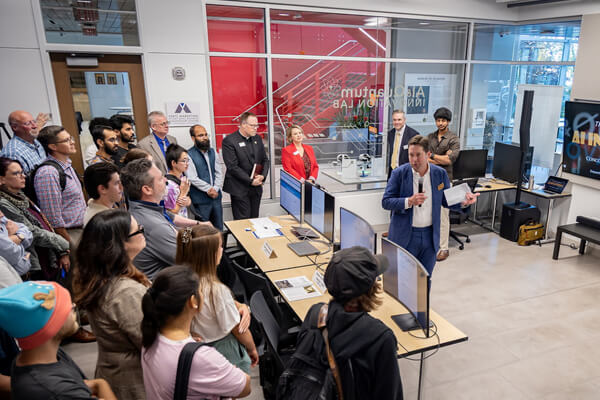
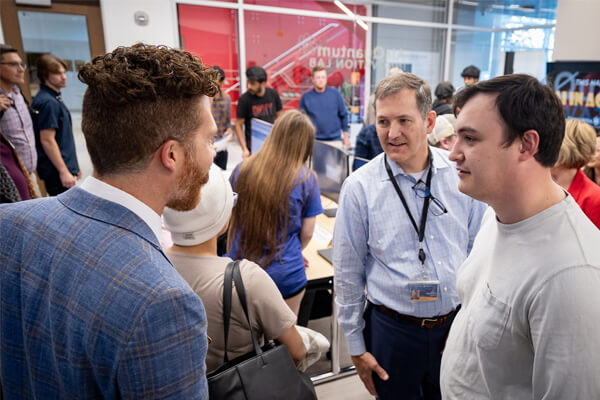
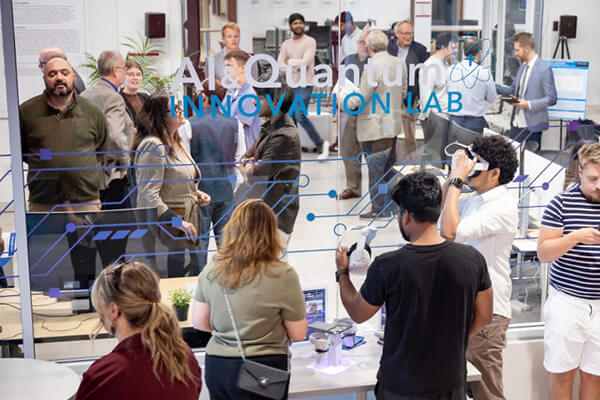
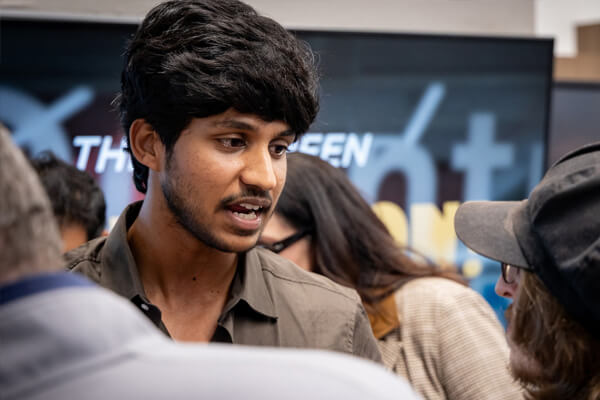
Below are a collection of slide decks presented during the AI & Quantum Innovation Lab pitch event that took place on November 5, 2025.
- Virtual Reality in Nursing School: Exploring immersive learning for future nurses [Tina Gaffney]
- Project SWARM [Dr. Michael Litman, Walid Ragey]
- Virtual Patient: Vaccine Hesitancy, An AI-Powered Simulator for Mastering Immunization Counseling [Andrew Tang]
- ML-Driven Stock Signal Engine: Empowering smarter investment decisions through explainable AI [Karthik Vodnala + CS Team]
- A.I. Language Learning [A.I. CS Club Subgroup]
- Fall Assesment VR Simulation [Rishi Preetham Sanagala]
- AI-Quantum Cancer Care Navigator: Predictive Health Management & Personalized Treatment Platform [Mahesh Aleti]
- Empowering University Research through Remote Data Science [Prof. John Fields]
News spotlight
-

Beyond the hype: Safe and ethical AI use for nurses
Tuesday, Nov. 18Understanding when—and when not—to trust AI in nursing is becoming a core competency
Read More -
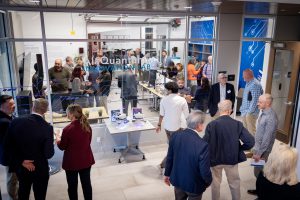
A new era of innovation: CUW opens AI & Quantum Innovation Lab to inspire servant leaders in science, technology
Thursday, Oct. 9Students, faculty, staff and community members gathered October 7 to celebrate the unveiling of Concordia University Wisconsin's new AI & Quantum Innovation Lab on campus.
Read More -

Transform the industry with a Bachelor of Science in Applied Artificial Intelligence degree
Wednesday, Jun. 18This cutting edge program is designed to responsibly usher CUW students into a world that is rapidly utilizing AI technology in many career fields. AAI graduates will be prepared to ethically utilize AI tools in today's society.
Read More -

Why a Master’s in Business Analytics Could Be Your Best Career Move
Thursday, May. 8In today’s data-driven world, organizations are racing to turn raw numbers into smart decisions—and they need skilled professionals who can make that happen. That’s where business analytics comes in. If you’ve been eyeing your next career move, an online Master of Science in Business Analytics could be the key to leveling up. Whether you’re already […]
Read More -
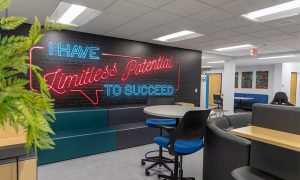
Up to code: CUW’s computer science space gets a reboot
Monday, Feb. 5Concordia University Wisconsin's computer science classrooms and ancillary spaces received an upgrade this past semester.
Read More -

Emerging Jobs in Tech
Friday, Jan. 20Concordia University Wisconsin and Ann Arbor is proud to have a Master's in Computer Science degree that prepares students for the job market
Read More -

Concordia’s Accelerated Bachelor of Arts in Applied Computer Science
Monday, Dec. 12Concordia offers an Accelerated Bachelor's in Applied Computer Science. The door to the tech industry is open. Are you ready to walk through?
Read More -

What are the fastest-growing jobs in tech?
Wednesday, Oct. 19With advancements in technology, it's no surprise that skilled individuals are needed. Take a look at the fastest-growing tech jobs.
Read More